In Taipei, where handmade pizza experienced a boom and has become the new norm in the restaurant scene, Salvatore Cuomo & Bar, an international chain restaurant from Japan, creates the latest buzz with the much-touted, award-winning pies that have spread across its birth country and to China and South Korea. A recent weekday visit shows that the restaurant is off to a good start, wooing diners with a lively vibe, hearty food and attentive service.
Interestingly, the newcomer, located inside the Breeze Center (微風廣場), has a hybrid feel that reflects its provenance. Shepherded by Italian-Japanese grand chef Salvatore Cuomo, the establishment sports a quintessential Italian menu featuring choices of antipasto, pizza and pasta dishes, while the Taiwanese and Japanese waiting staff greet customers in unison as if in a Japanese restaurant. Outfitted with a well-arrayed, open kitchen where young cooks wearing black bandana and in white uniforms are busy preparing food, the interior exudes an industrial urban chic, tempered by brick walls and warm earth tones. Service is attentive, and the couple of wait persons who served our table were quick and helpful for making recommendations.
My dining companions and I started our supper with the assorted buffalo mozzarella cheese and cherry tomato (NT$600), said to be one of the best choices to savor the restaurant’s famous, high-quality buffalo mozzarella, produced in Italy specifically for Cuomo’s culinary enterprise. Made from water buffalo milk, the cheese is soft, springy in texture and has a delicate, mild taste that is fragrantly creamy and never cloyingly rich.
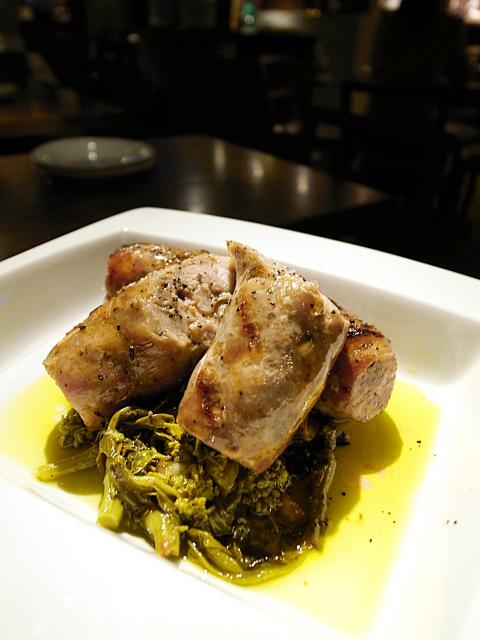
Photo: Ho Yi, Taipei Times
The romaine lettuce and egg salad (NT$320), on the other hand, was small and didn’t impress with the mushy vegetables.
Then comes the evening highlight: D.O.C (NT$700), Cuomo’s rendition of Neapolitan pizza that won top award at the Pizzafest, a world pizza championship held in Naples. With simple offerings of cherry tomato, basil and buffalo mozzarella, the pie makes simplicity tasteful, with the thin crust baked to a slightly crispy brown on the rim, while maintaining a satisfyingly buttery and chewy texture toward the center. But if diners don’t dive into the pizza right away, the crust tends to get soggy and can barely hold the toppings.
We also tried both the prosciutto and rucola (NT$750), topped with tomato sauce, buffalo mozzarella, smoked cheese, prosciutto ham, rocket greens and Parmesan, and bismark (NT$600), which comes with bacon, ham, spinach, mushrooms, semi-cooked egg and buffalo mozzarella. Both were good, but had the same problem of the soggy crust.
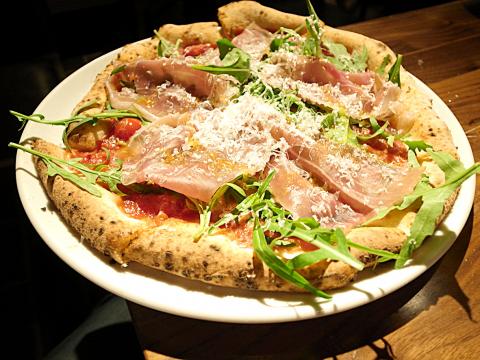
Photo: Ho Yi, Taipei Times
For pasta, we ordered the linguine aglio olio with swordfish and cabbage (NT$470), which my dining companions agreed was a bit too salty. Gnocchi and risotto are also on offer, while dishes like Neapolitan soup of seasonal seafood and fresh fish (NT$1,100) completes the restaurants’ southern Italian flavors.
To round off a hearty meal at Salvatore Cuomo & Bar, diners have several sweet options including tea-flavored panna cotta with fresh fruit sauce (NT$220), tiramisu (NT$220) and organic milk gelato topped with rich espresso sauce (NT$250).
Tipplers will be happy to know that Salvatore Cuomo & Bar has an extensive wine list made up of sparkling, white and red wines from Italy, France, German, Spain, Chile, Australia, New Zealand and the US (NT$230 to NT$280 by glass, NT$880 to NT$5,380 by bottle), along with a selection of beer and cocktails.
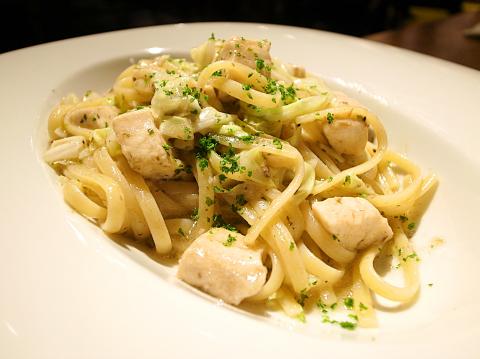
Photo: Ho Yi, Taipei Times
While the ambience of the restaurant is convivial for drinkers, one of my dining partners rightfully complained that the music played on the evening we visited was too loud and clubby, making it difficult for customers to relax and enjoy the food.
The restaurant offers lunch buffet that costs NT$500 on weekdays and NT$600 on weekends per head, plus 10 percent service charge. Only a la carte menu is available in the evening.
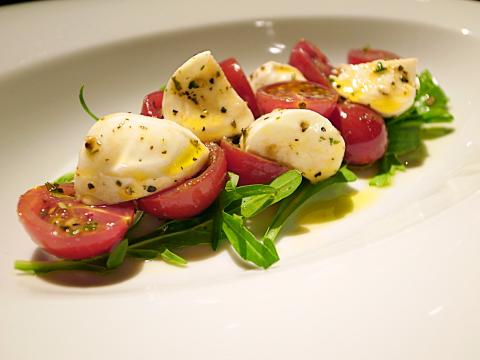
Photo: Ho Yi, Taipei Times
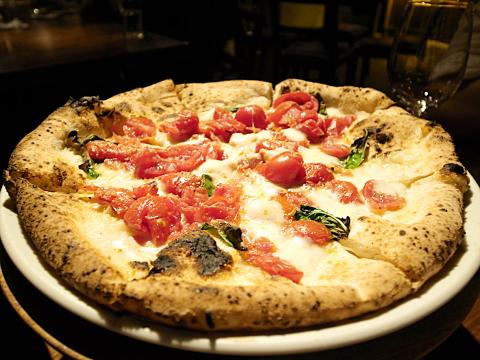
Photo: Ho Yi, Taipei Times

As Taiwan’s second most populous city, Taichung looms large in the electoral map. Taiwanese political commentators describe it — along with neighboring Changhua County — as Taiwan’s “swing states” (搖擺州), which is a curious direct borrowing from American election terminology. In the early post-Martial Law era, Taichung was referred to as a “desert of democracy” because while the Democratic Progressive Party (DPP) was winning elections in the north and south, Taichung remained staunchly loyal to the Chinese Nationalist Party (KMT). That changed over time, but in both Changhua and Taichung, the DPP still suffers from a “one-term curse,” with the

William Liu (劉家君) moved to Kaohsiung from Nantou to live with his boyfriend Reg Hong (洪嘉佑). “In Nantou, people do not support gay rights at all and never even talk about it. Living here made me optimistic and made me realize how much I can express myself,” Liu tells the Taipei Times. Hong and his friend Cony Hsieh (謝昀希) are both active in several LGBT groups and organizations in Kaohsiung. They were among the people behind the city’s 16th Pride event in November last year, which gathered over 35,000 people. Along with others, they clearly see Kaohsiung as the nexus of LGBT rights.

Jan. 26 to Feb. 1 Nearly 90 years after it was last recorded, the Basay language was taught in a classroom for the first time in September last year. Over the following three months, students learned its sounds along with the customs and folktales of the Ketagalan people, who once spoke it across northern Taiwan. Although each Ketagalan settlement had its own language, Basay functioned as a common trade language. By the late 19th century, it had largely fallen out of daily use as speakers shifted to Hoklo (commonly known as Taiwanese), surviving only in fragments remembered by the elderly. In

Dissident artist Ai Weiwei’s (艾未未) famous return to the People’s Republic of China (PRC) has been overshadowed by the astonishing news of the latest arrests of senior military figures for “corruption,” but it is an interesting piece of news in its own right, though more for what Ai does not understand than for what he does. Ai simply lacks the reflective understanding that the loneliness and isolation he imagines are “European” are simply the joys of life as an expat. That goes both ways: “I love Taiwan!” say many still wet-behind-the-ears expats here, not realizing what they love is being an